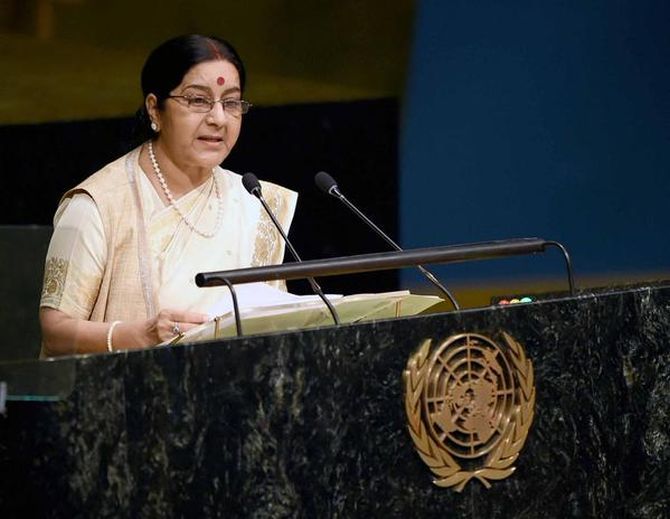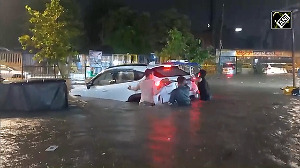At the largest international stage -- the UN General Assembly-- External Affairs Minister Sushma Swaraj sent out a stern message to Pakistan Prime Minister Nawaz Sharif, saying, "Talks and terror cannot go together".

Rejecting Nawaz Sharif’s 4-point formula for peace, India on Thursday said Pakistan needs to address “just one” issue of ending cross-border terror for the dialogue to start on all outstanding matters as it proposed National Security Advisor-level talks to discuss the matter.
Addressing the UN General Assembly, External Affairs Minister Sushma Swaraj also raised the issue of 26/11 attacks masterminds roaming freely as also the “illegal occupation” of parts of Jammu and Kashmir by Pakistan, a day after Pakistan Prime Minister Nawaz Sharif raked up the Kashmir issue.
Asserting that “none of us can accept that terrorism is a legitimate instrument of statecraft,” she pressed the world community to show zero tolerance towards it and ensure that countries which provide finances, safe havens and arms to terrorists “pay a heavy price” for it.
“Talks and terror cannot go together”, she said while making it clear that India “remains open to dialogue” but terrorism emanating from Pakistan is hampering normalisation of bilateral relations.
“Yesterday, the prime minister of Pakistan proposed what he termed as a four-point new peace initiative. I would like to respond. We do not need four points, we need just one -- give up terrorism and let us sit down and talk,” Swaraj said in her 25-minute speech before the 193-member body.
She said the prime ministers of the two countries had decided precisely the same during the last meeting in Ufa in Russia in July.
Sharif had on Thursday mooted a 4-point “peace initiative” with India -- demilitarisation of Kashmir, “unconditional and mutual withdrawal” of forces from Siachen, restraint by both countries from “use or the threat of use of force under any circumstances” and formalisation of the 2003 border ceasefire.
“Let us hold talks at the level of NSAs on all issues connected to terrorism and an early meeting of our directors general of military operations to address the situation on the border,” she said, adding “If the response is serious and credible, India is prepared to address all outstanding issues through a bilateral dialogue.”
Prime Minister Narendra Modi and Sharif, during a meeting in Ufa in July, had agreed to hold NSA-level talks to discuss terror but these were cancelled at the last minute in August when Pakistan insisted on changing the agenda.
Sharing the challenges that India faces in its ties with Pakistan, Swaraj said “None of us can accept that terrorism is a legitimate instrument of statecraft.”
In this context, she referred to the 26/11 carnage, which was sponsored and controlled from Pakistan as also the latest attack in Udhampur in Jammu where a Pakistani terrorist was caught alive.
“The world shared our outrage at the 2008 Mumbai terror attacks in which citizens of many nations were helplessly butchered,” Swaraj said, adding that it was an “affront to the entire international community” that the mastermind behind the attack is walking free in Pakistan.
This was a reference to Lashkar-e-Tayiba commander Zakiur Rehman Lakhvi, who is roaming freely in Pakistan despite India giving it loads of evidence about his involvement in the attacks.
“Not only have past assurances in this regard not been honoured (by Pakistan) but new cross-border terrorist attacks have taken place recently, in which two terrorists from across the border have also been captured alive,” Swaraj said.
One of the terrorists was caught alive during an attack on a Border Security Force convoy in Udhampur in Jammu and Kashmir.
“We all know that these attacks are meant to destabilise India and legitimise Pakistan’s illegal occupation of parts of the Indian state of Jammu and Kashmir and its claim on the rest of it,” the Indian minister said.
She said India has lived with the threat of terror for more than a quarter of a century and it was “tragically brought home to this very city” (New York) in the autumn of 2001, a clear reference to the 9/11 attacks.
Swaraj emphasised that international terrorism can only be defeated by organised international action and asked the world must demonstrate that it has zero tolerance for terrorists who kill and maim innocent civilians with action based on the principle of prosecute or extradite.
“Member states must undertake their obligations to investigate and prosecute those who are alleged to have supported terrorism,” the external affairs minister said.
At the same time, she asserted that an international legal regime, under the Comprehensive Convention on International Terrorism, “can no longer be held up, nor can we be held hostage by seeking to define terrorism when the General Assembly in 2006 adopted the Global Counter Terrorism Strategy unanimously.”
Targeting the UN on its 70th anniversary, she said it “appears as an ineffective institution” when gauged on the parameters of whether it has been able to prevent conflicts, managed to find permanent solution to these conflicts or showing the path of peace to the world which is going the way of violence.
Image: External Affairs Minister Sushma Swaraj addresses the UN General Assembly. Photograph: @MEAIndia/Twitter










